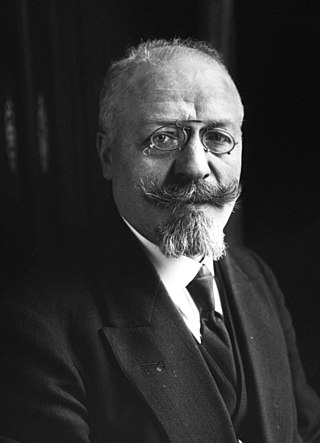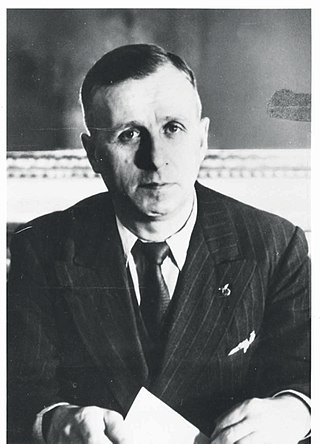Related Research Articles
La Vieille Taupe is a publishing house and bookshop in Paris, France. The establishment went through two distinct phases in its history. Between 1965 and 1972, it had a politically ultra-left slant. In 1980 a project with the same name was launched by one of La Vieille Taupe's previous participants and became renowned for publishing antisemitic and Holocaust denial literature.

Robert Faurisson was a British-born French academic who became best known for Holocaust denial. Faurisson generated much controversy with a number of articles published in the Journal of Historical Review and elsewhere, and by letters to French newspapers, especially Le Monde, which contradicted the history of the Holocaust by denying the existence of gas chambers in Nazi death camps, the systematic killing of European Jews using gas during the Second World War, and the authenticity of The Diary of Anne Frank. After the passing of the Gayssot Act against Holocaust denial in 1990, Faurisson was prosecuted and fined, and in 1991 he was dismissed from his academic post.
Serge Thion was a French sociologist. A former researcher at the French National Center for Scientific Research, he was dismissed from his position at the center for Holocaust denial activities.

Pierre Broué was a French historian and Trotskyist revolutionary militant whose work covers the history of the Bolshevik Party, the Spanish Revolution and biographies of Leon Trotsky.

Pierre Guillaume was a French political activist and publisher. He was the founder of the Paris book shop La Vieille Taupe in 1965 and later the Holocaust denying publishing house of the same name. A former member of Socialisme ou Barbarie, he moved to Pouvoir Ouvrier with Jean-François Lyotard and Pierre Souyri.
The Internationalist Communist Party was a Trotskyist political party in France. It was the name taken by the French Section of the Fourth International from its foundation until a name change in the late 1960s.

Gilles Dauvé is a French ultra-left political theorist, school teacher, and translator, associated with the development of communization theory.

Paul Rassinier was a political activist and writer who is viewed as "the father of Holocaust denial". He was also a member of the French resistance who survived Buchenwald and Mittelbau-Dora concentration camps. A journalist and editor, he wrote hundreds of articles on political and economic subjects.
Gérard Lebovici was a French film producer, editor and impresario.
Alain Guionnet is a French Holocaust denier.

The Mouvement Jeunes communistes de France (MJCF), commonly called the "JC", is the first political youth organisation of France, close to the French communist party.
Guy Besse was a French philosopher and politician, a member of the executive of the French Communist Party (PCF).

Serge July is a French journalist, editor, founder of the daily Libération, and a prominent figure in French politics from the 1970s through the 1990s. He is the author of several books and has directed more than fifty documentaries about cinema and politics. In recent times, he has been active in French organizations working in support of journalists taken hostage in Syria.

Adéodat Constant Adolphe Compère-Morel was a French Socialist politician, agronomist, orator and writer. Characterized as a Marxist doctrinaire, he was one of the founders of the Socialist Party of France. A gifted propagandist, he was a particular expert on social reform in rural France and became viewed as his party's agrarian specialist. He was an associate of the likes of revolutionary Marxist socialist journalist and literary critic Paul Lafargue and authored many books and papers, several of which were partly written with Lafargue. His best known and most influential work was Encyclopédie socialiste syndicale et coopérative de l'International ouvrière, published in 1912.
"Auschwitz or the great alibi" is a 1960 article published in Programme communiste, the French magazine of the International Communist Party (ICP), later reedited in the form of a brochure. The authorship of this text has been attributed to both Amadeo Bordiga and Martin Axelrad. However, the Programme communiste was a Bordigist revue, publishing its texts anonymously in order to emphasize its character of a collective work.
Georges Fontenis was a school teacher who worked in Tours. He is more widely remembered on account of his political involvement, especially during the 1950s and 1960s.

Ambroise Croizat was a French syndicalist and communist politician. As the minister of Labour and of Social security, he founded the French Social security system and the retirement system, between 1945 and 1947. He was also the general secretary of the Fédération des travailleurs de la métallurgie CGT.
Anarchism spread into Belgium as Communards took refuge in Brussels with the fall of the Paris Commune. Most Belgian members in the First International joined the anarchist Jura Federation after the socialist schism. Belgian anarchists also organized the 1886 Walloon uprising, the Libertarian Communist Group, and several Bruxellois newspapers at the turn of the century. Apart from new publications, the movement dissipated through the internecine antimilitarism in the interwar period. Several groups emerged mid-century for social justice and anti-fascism.

The Besançon Commune was a short-lived revolutionary movement conceived and developed in 1871, aiming at the proclamation of a local autonomous power based on the Lyon and Paris experiences. It originates from social upheavals which metamorphosed the city and with the emergence of unions including a section of IWA in connection with the future Jura Federation. The course of events was precipitated by the Franco-Prussian War, the fall of the Second Empire, and the advent of the Third Republic. While many notables testify to an insurrectionary context and armed support from Switzerland being organized, the correspondence left by James Guillaume and Mikhail Bakunin attest to a planned release between the end of May and the beginning of June 1871. However, with the start of the Semaine sanglante on 21 May and the pursuit of an internal campaign until 7 June, any attempt was seriously compromised. Despite the hope of a restart, in the following weeks and months the idea of an insurrection was definitively abandoned, later reinforced by the extinction of groups and activities described as "anarchist" from 1875.
References
- ↑ "Sommaires de la revue La Guerre Sociale (1977-1985)". Fragments d’Histoire de la gauche radicale. 6 May 2013. Retrieved 8 February 2016.
- Introduction to the Question of the State Retrieved 2 June 2008